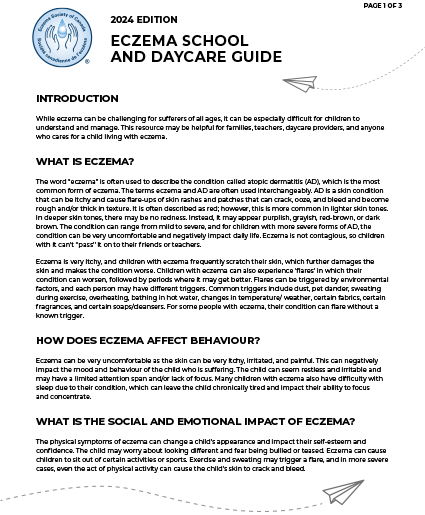Revised Eczema School and Daycare Guide helps facilitate the transition back to school and daycare.

When children are babies, we are used to caring for them and their eczema 24/7. But what happens when they start daycare or school? It can be an emotional experience to share the role of caregiver with a child’s teacher or daycare provider. Thankfully, teachers and daycare providers are often willing to take on this important role.
To help even more, ESC recently revised our Eczema School and Daycare Guide as a tool for fostering a safe and fun learning environment for children with eczema. ESC also spoke with Edmonton-based psychologist and eczema-sufferer Shawn Reynolds, PhD (who contributed to our guide) about ways to work with your child’s teacher or provider to help them
better understand eczema and their role in the child’s care.
He told ESC: “It can be helpful to engage teachers early so they can take an active and informed role in the child’s life. Communication and education are key. By suggesting strategies and language they can use with their students with eczema, we can help them avoid the temptation of resorting to negative consequences or shaming, because we know those approaches don’t work.”

For example, teachers and daycare providers need to know that when a child with eczema feels itchy, they may be unable to physically stop themselves from scratching. Dr. Reynolds explained: “Without a proper understanding of the condition, teachers or daycare providers may be tempted to reflexively tell the student to ‘just stop scratching,’ but we know that doesn’t work and if anything, may make things worse.”
He recommended that teachers can suggest a replacement behaviour, which could be giving a student something else to do with their hands instead of scratching. He added: “What is important as a teacher or caregiver is to eliminate negative consequences for their scratching and instead use positive reinforcements to help the student.”
For information on facilitating this conversation with your child’s teacher or daycare provider, check our Eczema School and Daycare Guide.
Eczema Society of Canada (ESC) thanks Shawn Reynolds, PhD, for his volunteer contribution to this educational content.
Disclaimer: Information provided in this resource does not constitute medical advice and is not intended to be used as a diagnostic tool. The information is up-to-date at time of publication. All medications, interventions, and treatment plans have risks and benefits, and it is important that individuals discuss their or their child’s specific health care needs with a qualified health care professional.
July 2024
